Unit 4 Body language 限制性定语从句 课件(33张PPT)
文档属性
| 名称 | Unit 4 Body language 限制性定语从句 课件(33张PPT) |  | |
| 格式 | zip | ||
| 文件大小 | 3.0MB | ||
| 资源类型 | 教案 | ||
| 版本资源 | 人教版(新课程标准) | ||
| 科目 | 英语 | ||
| 更新时间 | 2018-07-18 10:59:52 | ||
图片预览

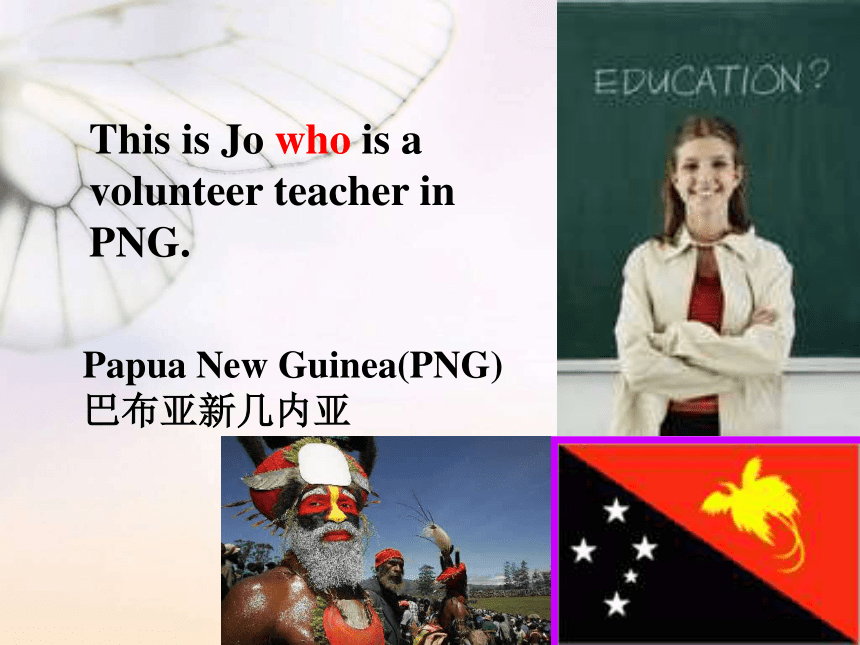


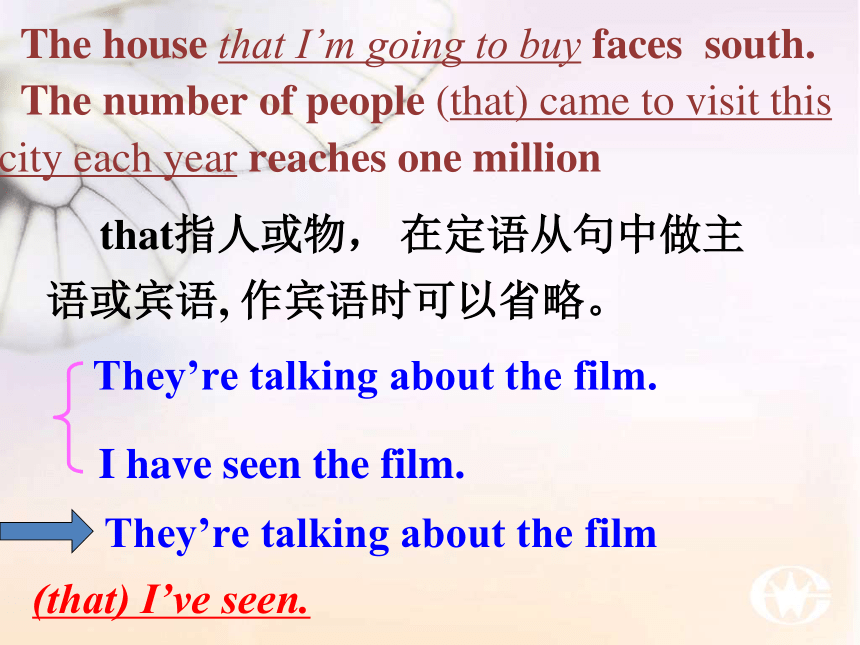
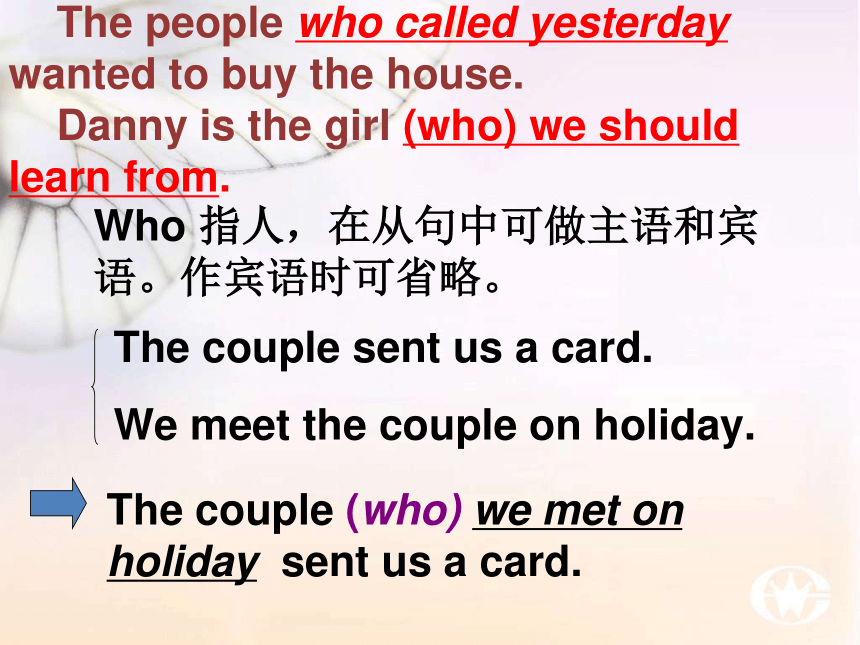
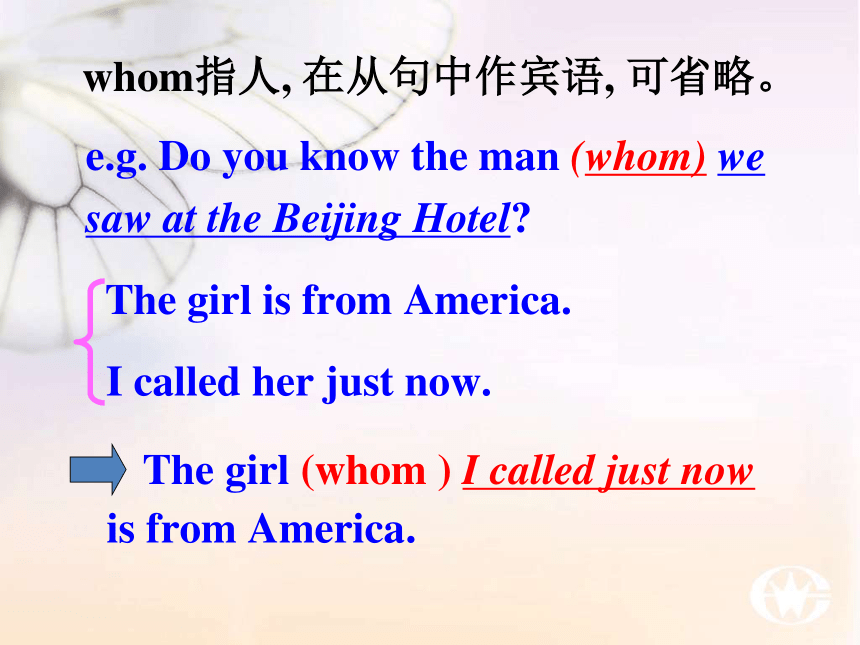



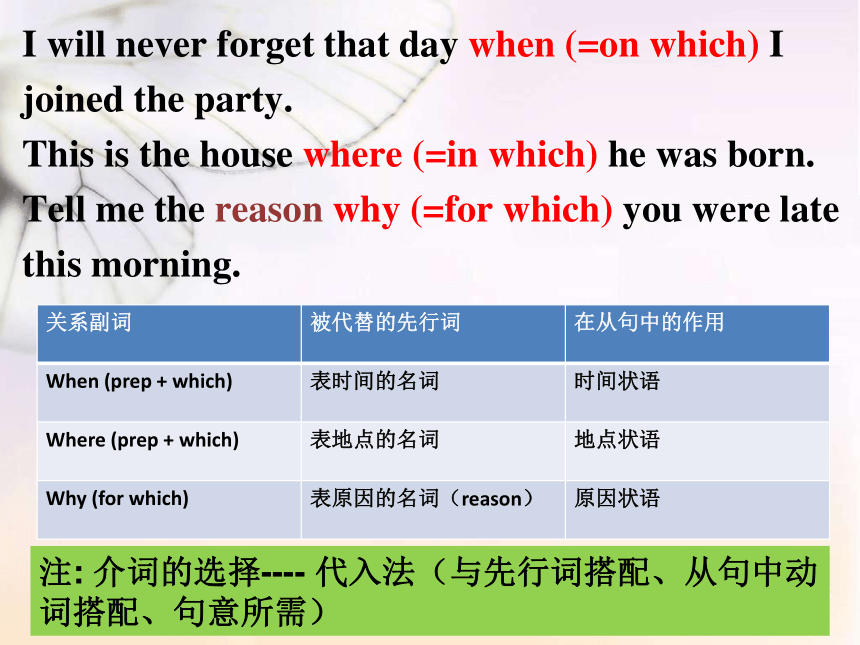

文档简介
课件33张PPT。Sharing 限制性定语从句Papua New Guinea(PNG)
巴布亚新几内亚This is Jo who is a
volunteer teacher in PNG.1. This is the house ___________ Jo lived two years ago.
2. This is the village ________________ Jo visited.
3. Jo will never forget the time _______________
she spent in PNG.
4. Jo was a volunteer at that time ______ she was in PNG. where which / that/ which / that/ whenFill in blanks with where, which, that and when.
(选词填空) 定语从句
定语从句(Attributive Clauses)在句中做定语,修饰一个名词或代词,被修饰的名词,词组或代词即先行词。定语从句通常出现在先行词之后,由关系词(关系代词或关系副词)引出。
关系代词有:who, whom, whose, that, which 关系副词有: when, where, why that指人或物, 在定语从句中做主语或宾语, 作宾语时可以省略。 The house that I’m going to buy faces south.
The number of people (that) came to visit this city each year reaches one million They’re talking about the film (that) I’ve seen. Who 指人,在从句中可做主语和宾语。作宾语时可省略。 The people who called yesterday wanted to buy the house.
Danny is the girl (who) we should learn from.The couple sent us a card.
We meet the couple on holiday.The couple (who) we met on holiday sent us a card.whom指人, 在从句中作宾语, 可省略。e.g. Do you know the man (whom) we saw at the Beijing Hotel?The girl is from America.I called her just now. The girl (whom ) I called just now is from America. which 指物, 在句中作主语或宾语, 作宾语时可以省略。I’m not interested in the book which has just been published.
This is the pen (that/which) he bought yesterday.
I have read the newspaper.It carries the important news. * whose 指人或物,在从句中作定语,whose = the + 名词 + of which(物)/of whom(人) 。 That’s the man whose house /the house of whom was burned down.
The station whose construction/ the construction of which was finished last year.
I will never forget that day when (=on which) I joined the party.
This is the house where (=in which) he was born.
Tell me the reason why (=for which) you were late this morning.注: 介词的选择---- 代入法(与先行词搭配、从句中动词搭配、句意所需)注:1.介词提前时一般只用which和whom。
2.whose+名词=the+名词+of which/ of whom★围绕高考来释难一、只用that的情况1.当先行词是不定代词all much.little.something.
everything.anything.nothing.none.the one时2.当先行词前面有only.any.few. little.no.all.
very等词修饰时 3.当先行词是形容词最高级或它的前面有形
容词最高级修饰时 4.当先行词是序数词或它前面有序数词修饰时5.当先行词既有人又有物时6.当主句的主语是疑问词who或which时7.有两个定语从句,其中一个关系代词已用
which,另外一个宜用that Tom is one of the students who _______ hard.
Tom is the only one of the students who _________ hard.关系代词在从句中作主语时,谓语动词的单复数与先行词的单复数形式一致。但先行词为 “one of + 复数名词” 时,谓语动词用复数形式;若先行词为“the only one of + 复数名词”时,谓语动词用单数形式。He is such a kind person as we all like him.
This is the same book as was bought yesterday.As 引导限制性定语从句时, 一般用于such…as…, the same … as…结构中。studystudiesWe admire the way _______________ he solved the problem.当先行词为way (方式)时,从句用that/in which/省略We have reached a point where a change is needed.
He gets into a situation ______ it is hard to decide what is right and wrong.当先行词为表示抽象地点的名词(case, state, condition, point, situation等), 且引导词在从句中作地点状语,引导词用where。(that/in which) where判断关系代词与关系副词 方法一:
用关系代词,还是关系副词完全取决于从句中的谓语动词。及物动词后面无宾语,就必须要求用关系代词;而不及物动词则要求用关系副词。例如: This is the mountain village where I stayed last year. I'll never forget the days when I worked together with you. 判断改错 1. This is the mountain village where I visited last year. 2. I will never forget the days when I spent in the countryside. 3. This is the mountain village (which) I visited last year. 4. I'll never forget the days (which) I spent in the countryside. FFTT方法二:
准确判断先行词在定语从句中的成分(主、谓、宾、定、状),也能正确选择出关系代词/关系副词。
Is this museum ___ you visited a few days age? A. where B. that
C. on which D. the one
2. Is this the museum ____ the exhibition was held. A. where B. that
C. on which D. the one The dining hall ___________ is nice and clean.
A. where we enjoy our meals
B. that we enjoy our mealsChoose the correct answer. A quizApril 20th was the day ____ an earthquake
hit Ya’an, Sichuan Province.
A. which B. when C. where
Choose the best answer. The students _____ I meet are very friendly.
who B. whom C. that D. which E. Choose the correct answers.
This is the girl ____________________________
____________________whose English is the best in
our class.Complete the sentence(完成句子).Her English is the best in our class. What is a volunteer(志愿者)?
A volunteer is a person……
(who/ that offer help without pay)
A volunteer is a person who offers help without pay.Define it with the attributive clause.
(用定语从句来下定义)A letter from JoComplete the letter with where, which,
that, when, who, whom and whose.
(完成文章)Dear Li Hua,
I am an Australian 1 _______ volunteered to teach in Papua New Guinea(PNG) for two years. The school 2______ I taught was in poor condition. The students crowded in small classrooms 3__________ were made of bamboo. No power or water and even no textbooks there. Most of the students 4__________ I taught would drop school at an early age.
I still remembered the day 5______ I visited a village. I was warmly welcome by the local villagers 6______ life was simple but not easy there. And the life style there impressed me deeply. It is such an honor to visit the village.
Yours Jo who/that wherewhich/thatwhenwhosewho/ that/ A volunteer in your school worked in a welfare center for children. Use attributive clauses to tell her experience. Task:welfare center
for children
(儿童福利院)I recently worked as a volunteer in a center.
Many homeless children are taken care of in the center. (where)
2. The center was being repaired at that time.
We visited the center. (that/which/)
3. Painting is an activity.
Most children really enjoy this activity. (that/which)
4. The girl looked excited.
The girl’s painting was put up on the wall. (whose)
5. I will never forget the day.
We spent the day together. (that/which)Join the two sentences with an attributive clause.
For example:
I recently worked as a volunteer in a center.
Many homeless children are taken care of
in the center. (where)
I recently worked as a volunteer in a center where
many homeless children are taken care of.I recently worked as a volunteer in a center.
Many homeless children are taken care of in the center. (where)
2. The center was being repaired at that time.
We visited the center. (that/which/)
3. Painting is an activity.
Most children really enjoy this activity. (that/which)
4. The girl looked excited.
The girl’s painting was put up on the wall. (whose)
5. I will never forget the day.
We spent the day together. (that/which)Join the two sentences with an attributive clause.I recently worked as a volunteer in a center where
many homeless children are taken care of.
2. The center (that/ which)we visited was being repaired at that time.
3. Painting is an activity (that/which)most children really enjoy.
4. The girl whose painting was put up on the wall looked excited
5. I will never forget the day(that/ which)we spent the day together.
Give roses to others and the lasting fragrance will remain in your hand.
HomeworkPlease finish the exercises on
your exercise book.Thank you!
巴布亚新几内亚This is Jo who is a
volunteer teacher in PNG.1. This is the house ___________ Jo lived two years ago.
2. This is the village ________________ Jo visited.
3. Jo will never forget the time _______________
she spent in PNG.
4. Jo was a volunteer at that time ______ she was in PNG. where which / that/ which / that/ whenFill in blanks with where, which, that and when.
(选词填空) 定语从句
定语从句(Attributive Clauses)在句中做定语,修饰一个名词或代词,被修饰的名词,词组或代词即先行词。定语从句通常出现在先行词之后,由关系词(关系代词或关系副词)引出。
关系代词有:who, whom, whose, that, which 关系副词有: when, where, why that指人或物, 在定语从句中做主语或宾语, 作宾语时可以省略。 The house that I’m going to buy faces south.
The number of people (that) came to visit this city each year reaches one million They’re talking about the film (that) I’ve seen. Who 指人,在从句中可做主语和宾语。作宾语时可省略。 The people who called yesterday wanted to buy the house.
Danny is the girl (who) we should learn from.The couple sent us a card.
We meet the couple on holiday.The couple (who) we met on holiday sent us a card.whom指人, 在从句中作宾语, 可省略。e.g. Do you know the man (whom) we saw at the Beijing Hotel?The girl is from America.I called her just now. The girl (whom ) I called just now is from America. which 指物, 在句中作主语或宾语, 作宾语时可以省略。I’m not interested in the book which has just been published.
This is the pen (that/which) he bought yesterday.
I have read the newspaper.It carries the important news. * whose 指人或物,在从句中作定语,whose = the + 名词 + of which(物)/of whom(人) 。 That’s the man whose house /the house of whom was burned down.
The station whose construction/ the construction of which was finished last year.
I will never forget that day when (=on which) I joined the party.
This is the house where (=in which) he was born.
Tell me the reason why (=for which) you were late this morning.注: 介词的选择---- 代入法(与先行词搭配、从句中动词搭配、句意所需)注:1.介词提前时一般只用which和whom。
2.whose+名词=the+名词+of which/ of whom★围绕高考来释难一、只用that的情况1.当先行词是不定代词all much.little.something.
everything.anything.nothing.none.the one时2.当先行词前面有only.any.few. little.no.all.
very等词修饰时 3.当先行词是形容词最高级或它的前面有形
容词最高级修饰时 4.当先行词是序数词或它前面有序数词修饰时5.当先行词既有人又有物时6.当主句的主语是疑问词who或which时7.有两个定语从句,其中一个关系代词已用
which,另外一个宜用that Tom is one of the students who _______ hard.
Tom is the only one of the students who _________ hard.关系代词在从句中作主语时,谓语动词的单复数与先行词的单复数形式一致。但先行词为 “one of + 复数名词” 时,谓语动词用复数形式;若先行词为“the only one of + 复数名词”时,谓语动词用单数形式。He is such a kind person as we all like him.
This is the same book as was bought yesterday.As 引导限制性定语从句时, 一般用于such…as…, the same … as…结构中。studystudiesWe admire the way _______________ he solved the problem.当先行词为way (方式)时,从句用that/in which/省略We have reached a point where a change is needed.
He gets into a situation ______ it is hard to decide what is right and wrong.当先行词为表示抽象地点的名词(case, state, condition, point, situation等), 且引导词在从句中作地点状语,引导词用where。(that/in which) where判断关系代词与关系副词 方法一:
用关系代词,还是关系副词完全取决于从句中的谓语动词。及物动词后面无宾语,就必须要求用关系代词;而不及物动词则要求用关系副词。例如: This is the mountain village where I stayed last year. I'll never forget the days when I worked together with you. 判断改错 1. This is the mountain village where I visited last year. 2. I will never forget the days when I spent in the countryside. 3. This is the mountain village (which) I visited last year. 4. I'll never forget the days (which) I spent in the countryside. FFTT方法二:
准确判断先行词在定语从句中的成分(主、谓、宾、定、状),也能正确选择出关系代词/关系副词。
Is this museum ___ you visited a few days age? A. where B. that
C. on which D. the one
2. Is this the museum ____ the exhibition was held. A. where B. that
C. on which D. the one The dining hall ___________ is nice and clean.
A. where we enjoy our meals
B. that we enjoy our mealsChoose the correct answer. A quizApril 20th was the day ____ an earthquake
hit Ya’an, Sichuan Province.
A. which B. when C. where
Choose the best answer. The students _____ I meet are very friendly.
who B. whom C. that D. which E. Choose the correct answers.
This is the girl ____________________________
____________________whose English is the best in
our class.Complete the sentence(完成句子).Her English is the best in our class. What is a volunteer(志愿者)?
A volunteer is a person……
(who/ that offer help without pay)
A volunteer is a person who offers help without pay.Define it with the attributive clause.
(用定语从句来下定义)A letter from JoComplete the letter with where, which,
that, when, who, whom and whose.
(完成文章)Dear Li Hua,
I am an Australian 1 _______ volunteered to teach in Papua New Guinea(PNG) for two years. The school 2______ I taught was in poor condition. The students crowded in small classrooms 3__________ were made of bamboo. No power or water and even no textbooks there. Most of the students 4__________ I taught would drop school at an early age.
I still remembered the day 5______ I visited a village. I was warmly welcome by the local villagers 6______ life was simple but not easy there. And the life style there impressed me deeply. It is such an honor to visit the village.
Yours Jo who/that wherewhich/thatwhenwhosewho/ that/ A volunteer in your school worked in a welfare center for children. Use attributive clauses to tell her experience. Task:welfare center
for children
(儿童福利院)I recently worked as a volunteer in a center.
Many homeless children are taken care of in the center. (where)
2. The center was being repaired at that time.
We visited the center. (that/which/)
3. Painting is an activity.
Most children really enjoy this activity. (that/which)
4. The girl looked excited.
The girl’s painting was put up on the wall. (whose)
5. I will never forget the day.
We spent the day together. (that/which)Join the two sentences with an attributive clause.
For example:
I recently worked as a volunteer in a center.
Many homeless children are taken care of
in the center. (where)
I recently worked as a volunteer in a center where
many homeless children are taken care of.I recently worked as a volunteer in a center.
Many homeless children are taken care of in the center. (where)
2. The center was being repaired at that time.
We visited the center. (that/which/)
3. Painting is an activity.
Most children really enjoy this activity. (that/which)
4. The girl looked excited.
The girl’s painting was put up on the wall. (whose)
5. I will never forget the day.
We spent the day together. (that/which)Join the two sentences with an attributive clause.I recently worked as a volunteer in a center where
many homeless children are taken care of.
2. The center (that/ which)we visited was being repaired at that time.
3. Painting is an activity (that/which)most children really enjoy.
4. The girl whose painting was put up on the wall looked excited
5. I will never forget the day(that/ which)we spent the day together.
Give roses to others and the lasting fragrance will remain in your hand.
HomeworkPlease finish the exercises on
your exercise book.Thank you!
同课章节目录
